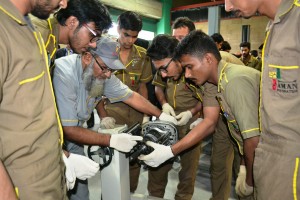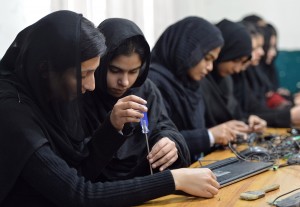 Technical and Vocational Education and Training (TVET) is a discipline of education, training and learning activity that helps beneficiaries secure skilled jobs or opt for self-employment. The skill-set they obtain through this training, make them eligible to enter in the indigenous job market.
Technical and Vocational Education and Training (TVET) is a discipline of education, training and learning activity that helps beneficiaries secure skilled jobs or opt for self-employment. The skill-set they obtain through this training, make them eligible to enter in the indigenous job market.
Pakistan’s TVET sector faces a number of challenges, including the lack of access to quality and relevant education by a huge population. The curriculum and disciplines taught to the students are often outdated and there is a major disconnect between the training institutes and private sector organizations which adds up to the irrelevant workforce development.
The gap is prevailing day-by-day due to a limited cooperation between the public and the private sector for the TVET governance and delivery. As a consequence, the workforce produced lacks demand-driven approach and hence is a mismatch to the fast changing dynamics of the domestic and foreign job markets.
Against this backdrop, the realization of having an increased participation between private and public sector and ownership of the public sector organizations are a key to mainstream the skilled workforce and reforming the TVET sector. No doubt, the public and private sector can work like hand and gloves with each other and upgrade the curriculum according to the demands of the job market. Besides, they can mutually agree on introduction of new disciplines and creation of on-the-job training opportunities of the trainees.
To address the perennial issues of the TVET sector, the Government of Pakistan launched a TVET Reform Support Program (TRSP) in 2011 with an aim to devise a National Skills Strategy (NSS), introduced systems to impart and assess skills, making this sector as an engine to economic growth. This is a multi-lateral initiative co-funded by the European Union (EU), the Embassy of the Kingdom of the Netherlands and the Federal Republic of Germany, and being implemented in Pakistan by the GIZ. The first phase of TVET Reform Support ended in December 2016 and the second one started in January 2017 for another five years. The overall objective of the Programme is to improve governance and private sector participation in the TVET sector to increase quality skill development that meets the demand of the labour market. Milestones achieved during the first phase include formulation of TVET policy and National Vocational Qualifications Framework (NVQF) and introduction of Competency Based Training & Assessment (CBT&A).
 Increased participation of private sector and ownership of public sector organizations is one of the integral factors to bring the skilled workforce in mainstream. In view, five forums on national and provincial level were developed and notified during the month of May, 2017 with the support of TVET Reform Support Programme.
Increased participation of private sector and ownership of public sector organizations is one of the integral factors to bring the skilled workforce in mainstream. In view, five forums on national and provincial level were developed and notified during the month of May, 2017 with the support of TVET Reform Support Programme.
The establishment of these forums on federal and provincial level will help to increase the collaboration between the public and private sector bodies in the TVET sector. The representatives from the public and private sector organizations had the common voice on the acknowledgment of the collaborative efforts of public and private sector hand-in-hand. Without this collaboration it is impossible that the skill improvement of relevant expertise may be developed, certified and contributed mitigating the demand of skilled workforce of the country.
The importance of formation of Sector Skill Councils (SSCs) in relevant sectors was equally recognized by the NAVTTC, provincial TEVTAs, Vocational Training Councils, Business and Industry Associations. These forums will perform as a secretariat to provide platform for stakeholders to discuss issues, challenges and opportunities pertaining to TVET programmes and labour market and provide solutions. The forums will advocate the paradigm shift of the traditional methods of training and vocational education to Competency Based Training & Assessment (CBT&A) and Recognition of the Prior Learning (RPL).
 Pakistan TVET REFORM Support Programme Technical and Vocational Education and Training (TVET) Reform support Programme
Pakistan TVET REFORM Support Programme Technical and Vocational Education and Training (TVET) Reform support Programme






